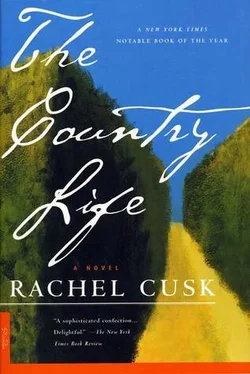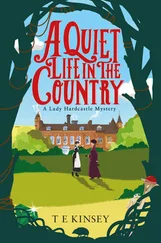‘Afternoon, Martin!’ said a cheerful voice.
‘Hello, Mary,’ Martin replied. ‘This is my friend Stella.’
A woman had emerged from a door at the far end of the room, and now took up a position behind the desk. She was quite elderly, with grey hair set in waves. I was momentarily confused, thinking that I recognized her.
‘Stella, is it?’ she said, to me. ‘Nice to have you here, love.’
I realized that she resembled the woman who ran the village shop in Hilltop.
‘Thank you,’ I said.
‘You’d better hurry in,’ she said. ‘I think they’ve started without you.’
‘Started what?’ I said, following Martin through a doorway at the end of the reception area and down a long corridor.
‘Discussion,’ he said. ‘That’s how they kick off. You’re not supposed to miss it.’
The corridor, like the reception area, was hung with drawings. From the far end, I could hear a growing rabble of voices. Although it didn’t particularly resemble mine, the place reminded me unpleasantly of school. I was conscious, strangely, of my physical size, and of the freedom of my own clothes as I walked. We reached the end of the corridor, and Martin pushed open a door directly ahead which stood slightly ajar. The noise I had heard from the corridor was abruptly silenced. I followed behind him, and as the door swung shut I was confronted by an extraordinary scene. The room was large and very light, with windows all along one wall; and in the centre of it, the sun glancing off them in blinding flashes of steel, was a throng of wheelchairs.
‘Well, look who’s here!’ said a woman’s voice.
For a moment I could not work out which among the blank, mute faces which stared at us from within the vast metallic tangle of apparatus had spoken. Looking up, my eyes met a pair level with my own, and I realized that the woman who stood at the centre of this curious circle must be the teacher.
‘Hello,’ I said, addressing myself to her. ‘I’m Stella.’
‘Hello, Stella!’ she replied; not, I felt, entirely convinced by my attempt to communicate with her as one adult to another. She looked down at her blood. ‘Say hello to Stella, everybody!’
There was a dissonant chorus of ‘Hello, Stella,’ which began as a rumbling groundswell and tailed off into fluting chirps of welcome. Martin wheeled himself towards the group and took up a position on its fringes. His face was sullen. I lingered awkwardly, looking around for a chair.
‘Stella, why don’t you sit over there?’ said the woman, pointing to a chair by the wall.
‘OK,’ I said.
‘Why can’t she sit with us?’ interposed a boy’s voice gruffly. The words were slightly slurred.
‘Yes! Yes!’ chorused some of the others in agreement.
‘ I see.’ The woman laughed ingratiatingly. I sensed that she was not pleased by this minor uprising. ‘Who thinks Stella should come and join our group?’
There was an immediate bristling of raised arms and straining torsos.
‘OK,’ she said, looking around the group with an expression of concentration, as if conducting a serious calculation of votes. ‘Well, it looks as if you’re very popular today, Stella! Do you want to draw your chair up just there? That’s it.’
I moved my chair and sat down again. Raising my eyes, I saw that every face was turned towards me and I smiled stiffly. From where I sat, I could only see Martin’s shoulder and the side of his head.
‘Martin!’ said the woman, raising her eyebrows and opening her eyes wide. ‘Would you like to tell us why you were late again?’
She spoke very clearly, as if there was some danger that he wouldn’t understand what she said. The portion of Martin I could see didn’t move.
‘Sorry,’ he mumbled.
‘We talked about this last week, didn’t we? I think we all felt that your lateness was a problem, and that the others felt undermined by it. I think you said that you were going to make an effort to be on time, didn’t you?’
‘It was my fault!’ I interrupted, horrified by the woman’s remarks.
‘Stella says it was her fault,’ said the woman after a pause, never taking her eyes from Martin. ‘Is that true?’
‘I was supposed to drive him and I got delayed,’ I insisted.
At this the woman turned to look at me. Her expression was steely.
‘We like to let the children speak for themselves here, Stella,’ she said. ‘Is that true, Martin?’
‘I suppose so,’ said Martin.
Trying to distract myself from the extreme dislike I was taking to this woman, I looked around at the group. There were about thirty of them, in roughly equal numbers of boys and girls. Most of them seemed considerably younger than Martin; several were barely more than children. It was very odd to see in replica the features I had come to associate with Martin’s singularity. In numbers they took on the look of a species; and realizing this, I am afraid to say that I found myself in strong disagreement with the whole character of this convention, and not merely with its leader. The notion that Martin’s misfortune should be promoted to the status of a characteristic struck me as wrong. It did not now surprise me, given the indignity of his qualification to attend it, that he disliked the centre so intensely.
‘I think some of the others feel that by being late you’re giving out strong messages that you don’t want to be part of the group,’ persisted the woman. ‘I think you felt that, Marie, didn’t you?’
Her wide eyes described a significant arc, landing on a girl of about Martin’s age sitting opposite me on the other side of the room.
‘Yeah,’ said Marie. Her voice was high-pitched. She had long, fair hair and a tragic expression.
‘I think you felt that Martin was trying to seek attention, didn’t you?’ said the woman presently, when it became clear that Marie was to say nothing more.
‘Yeah,’ said Marie.
‘What do you say to that, Martin?’
‘It’s crap,’ said Martin.
One or two people sniggered.
‘Miss!’ said a younger boy with a thick basin of dark hair, his arm shooting up. ‘He said crap !’
‘I know he did, Stephen,’ sighed the teacher. ‘Don’t you remember that we agreed Martin could sometimes use that sort of language, because that’s how they speak at home? Do you remember that?’
‘It’s true,’ I assented, nodding.
‘Martin, do you see now how distracting your late entrances are? Do you see why the others might think you’re attention-seeking?’
‘I suppose so.’
‘Good. So will you be making more of an effort in future?’
‘ Yes ,’ said Martin irritably.
‘OK!’ said the woman brightly, the musical cadence of the word signalling a change of subject. ‘Let’s begin our discussion, shall we? This week I wanted to talk about feelings .’
‘Feelings,’ repeated the group. There was something incantatory in the woman’s tone which made the response automatic.
‘Now,’ she continued. ‘Who can tell me what feelings are?’
Hands shot up into the air.
‘Let’s see.’ The woman pursed her lips and made a selecting motion with her hand, as if she were choosing a sweet. ‘Elizabeth.’
‘They’re emotions,’ said Elizabeth, an unfortunate-looking redhead.
‘Ye-es,’ said the woman coaxingly, implying that the answer had been insufficient. ‘What sort of emotions?’
‘All sorts,’ said Elizabeth quizzically.
‘That’s right. Good and bad. Who can tell me a good feeling? Stephen.’
Stephen was straining again with his arm aloft.
‘Eating chocolate!’ he cried.
‘Ye- es ,’ said the woman, even more doubtfully. ‘But that’s more of a sensation , isn’t it?’
Читать дальше












